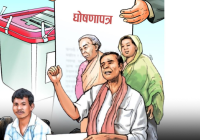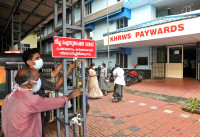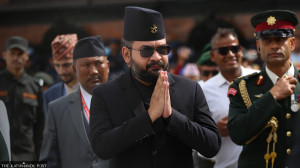Opinion
Wrong move
Declaring a public holiday during Mukherjee’s visit has set a very bad precedent
Khagendra N. Sharma
The government’s decision to declare a holiday on the day the Indian president visited Nepal has created a very bad precedent. On social media, many Nepalis have called it lampasarbad or the state of paying obeisance by prostrating oneself.
The government was conscious of people’s view that it was being done to thank the Indian government for remotely launching the present government, and to mitigate that allegation, it said that this honour would be extended to the Chinese president as well. But it was a poor face-saving attempt by the government because there is no official word yet on whether the Chinese president is coming or not.
What threat?
The Indian president’s three day visit was a welcome event, except that it fully paralysed normal life in Kathmandu, particularly in the areas he visited, because of ‘security concerns’. Kathmandu’s main roads were closed to the public for most of the three days. Kathmandu looked like a day of bandh declared by radical Maoists. It is fair enough to pause traffic for a while to let the VVIP entourage pass, but it is inconceivable to block all the main roads for hours. Why was it done? Is Nepal facing a terrorist threat? Are Nepalis untrustworthy? Or was there a special threat to the Indian president?
Security is a concern for any government. But there are simpler ways to maintain it. The government had deployed three layers of security—the Police, the Army and the Armed Police Force—for the safety of the Indian president. On top of that, the Indian government had deployed a special security contingent for the occasion. So security could have been maintained without disturbing normal public activities in the city. But the government behaved as if Nepalis were living under a great terror threat. Three days of obstruction cause incalculable social and economic loss.
Security is a relatively minor aspect compared to diplomatic norms in bilateral relations. Visits of VVIPs and high level officials are a regular affair between two friendly states. Heads of state and government carry a special status, which is honoured through different symbols like 21 gun salutes, military or civic honours, honorary academic degrees and the like. The head of an empire used to visit colonies in a special imperial status during the colonial era. Although Nepal is still an underdeveloped country, we take pride in the fact that we were never colonised by any power. The rulers of British India made Nepal a source of martial power, but they respected Nepal’s independence. Recognition of Nepal’s sovereignty grew after it became a UN member. Nepal’s cultural ties with India are age-old, but both countries should have mutual respect.
Feudal relics
Is the present government giving India the status of an imperial power? This possibility is also corroborated by the way the Indian Ambassador behaves—as if he were the governor general to Nepal. How many of our so-called national leaders including prime ministers have criticised, let alone revolted against, the political intervention of the Indian envoy in the form of cross-party lunches and comments on Nepal’s domestic affairs? It looks as if our leaders have not only accepted but invited India’s suzerainty. Many intellectual voices are often heard cautioning against the tendency towards the Sikkimisation of Nepal. But most of our leaders are indirectly inviting it. The declaration of a public holiday on the occasion of the Indian president’s visit is but one example.
It is a good practice to invite VVIPs of friendly countries for official visits but there is also a thing called reciprocity. Nepal’s president is likely to visit India in the near future. Can we expect the Indian government to declare a holiday during the visit? Has India declared a holiday on the occasion of the state visit of any other country’s head of state? Visits of VVIPs from friendly countries happen all over the world. But giving holidays on such occasions is emblematic of a feudal past. Whenever the king of Nepal went on state visit to a friendly country, two days of holidays were declared—the day the king left and the day he returned. Such snobbery was one of the many reasons why monarchy became a liability to the state. For a poor country, a holiday means a substantial loss of output; it makes little contribution to the country.
VVIPs from other countries
Let us examine the case from another perspective as well. India had very recently troubled Nepal by imposing a prolonged embargo. To allay Nepal’s resentment, India had to demonstrate some good gesture. The goodwill visit of the Indian president was a part of that gesture. Pranab Mukherjee is not only aware of Nepali affairs, but he had also visited Nepal in his former role as India’s minister and had helped Nepal in several ways. The signing of the 12-point agreement between the Seven-Party Alliance and the Maoists in Delhi is one vivid example. So, on a personal level, he was a most welcome guest. On its part, Nepal extended the most cordial hospitality. The Nepali people appreciate it from the core of their hearts. But the declaration of the holiday and the closure of the roads inconvenienced the same people. It was by all means a very bad precedent which could and should have been avoided.
The government has classified the holiday to be applicable to the presidents of India and China. But if the president of the United States pays a goodwill visit to Nepal, do we follow the precedent or not? And If the US president is honoured with such respect, how can we deny it to VVIPs from other countries?
Sharma is a political analyst. He can be contacted at [email protected]




 7.12°C Kathmandu
7.12°C Kathmandu










